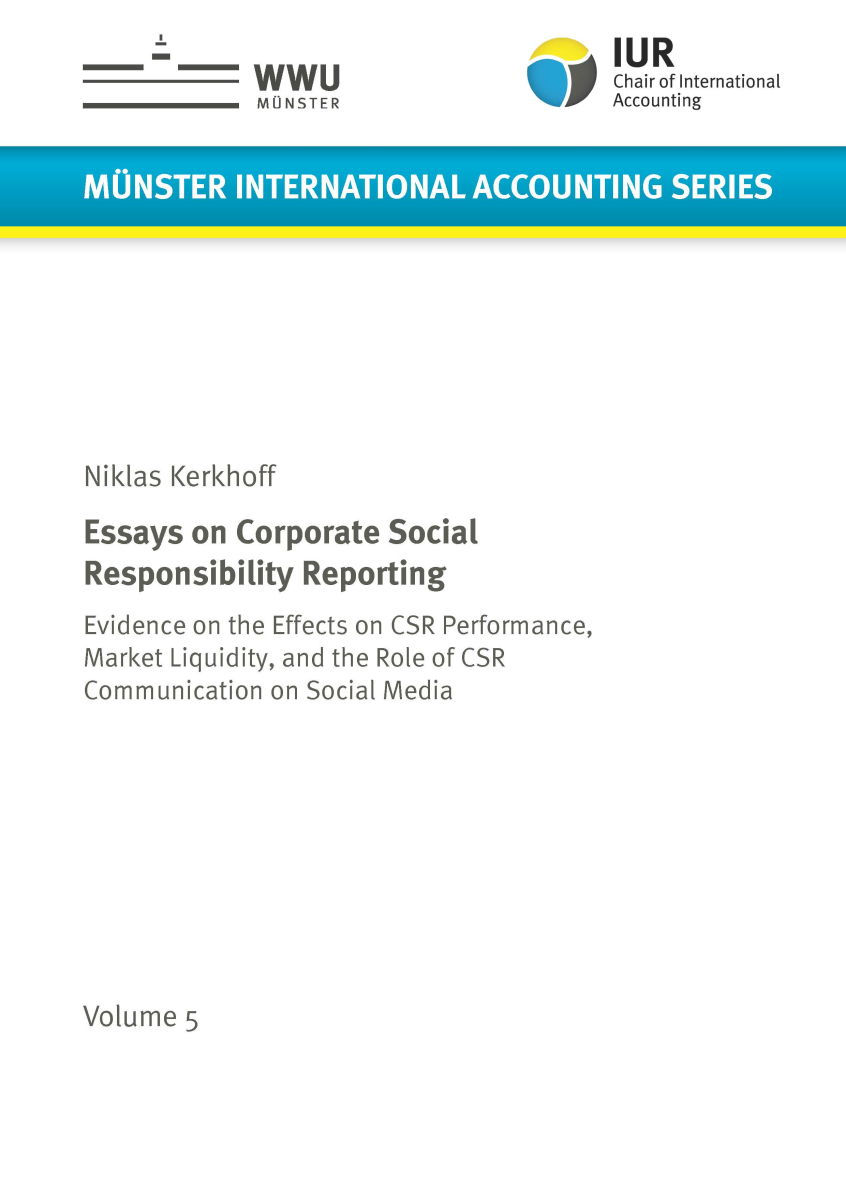Volume 5
Niklas Kerkhoff – Essays on Corporate Social Responsibility Reporting - Evidence on the Effects on CSR Performance, Market Liquidity, and the Role of CSR Communication on Social Media
Bestellen (Link folgt)

What role can companies play in addressing environmental or social issues such as the climate crisis or social inequalities which, even though they exist on a global scale, affect each one of us as an individual? These questions are increasingly interesting for stakeholders and, consequently, often addressed in various disclosures such as CSR reports. The aim of this thesis is to explore this nexus of CSR reporting at the interface between voluntary and mandatory reporting types, both in traditional reporting and emerging disclosure channels. In the three individual studies of his thesis, Niklas Kerkhoff explores firms’ CSR reporting, examines how mandatory CSR reporting is perceived by investors, and inspects possible mechanisms through which CSR disclosures could help leading towards more socially responsible firm behavior and thus a more sustainable economy.
The first study (“The Effect of CSR Disclosure Regulation on Firms’ CSR Reporting Practices and Performance”) explores how firms alter their CSR reporting practices and whether they change their CSR performance in response to a disclosure mandate. To this end, it leverages the setting of the European CSRD, the first supranational mandatory CSR reporting regulation. Employing textual analysis and relying on CSR rating data from specialized rating agency ASSET4, it finds that firms significantly alter their reporting, but not necessarily improve their behavior in response to the mandate. The findings thereby support the notion that CSR disclosure and performance are only partly related and provide no evidence that the CSR disclosure mandate yields the behavioral effects desired by the regulator. Given that debates about mandating CSR disclosures are on the agenda of several regulators, the finding that CSR reporting and CSR performance can be decoupled from each other may cause regulators to rethink the concept of “targeted transparency” regulation in favor of more direct approaches to push firms towards more sustainable behavior.
The second study (“Liquidity Effects of Mandatory Corporate Social Responsibility Reporting – Evidence from Europe”) investigates the same European disclosure mandate. This study focuses on the transparency channel by analyzing whether mandatory CSR reporting can lead to improved liquidity in capital markets. Using an RDD and exploiting the application thresholds of the mandate, the study documents significant liquidity benefits for regulated firms that comply with the mandate relative to non-complying and non-mandated firms. Results hence indicate that mandatory CSR disclosure can indeed improve transparency. Thus, this study offers regulators a response to the critics who often question the usefulness of principle-based and discretionary CSR reporting mandates and help EU regulators to assess the CSRD’s effectiveness along the transparency dimension.
The third study (“Investor Requests on Social Media – The Effects of Audit Status Communication and Message Source on Investor Judgments”) deals with the voluntary communication of CSR information in social media. Although these represent an increasingly important communication channel, CSR information in particular is often subject to greater skepticism on such platforms. Consequently, companies often do not yet fully exploit the potential of these new communication channels. The study therefore examines how companies can credibly disseminate decision-useful CSR information in social media and respond to critical investor requests in the process. With personal communication by the CEO and the secondary dissemination of externally verified information, the study presents two effective mechanisms for improving communication. This study is the first to explicitly investigate the effects of audit status communication on social media, where users normally expect unaudited information. The study hence advances our understanding of how firms can respond to investor requests on social media more effectively. The study calls attention to the need for more credible CSR disclosures and provides firms with a better understanding of how to effectively engage with their stakeholders on this new communication channel.
All in all, the studies suggest that CSR reporting can lead to significant benefits, but that these are by no means guaranteed to materialize. Thereby, the three studies provide insights that may help regulators shape the effectiveness of CSR communication via regulation, and allow firms to make better use of the tools and channels they have at their disposal. Hence, insights gained from these studies may be used in such a way that stakeholders receive more reliable and consistent information, facilitating their monitoring of firm behavior. Ultimately, this thesis highlights how CSR disclosures could help leading towards more socially responsible firm behavior and thus a more sustainable economy.


